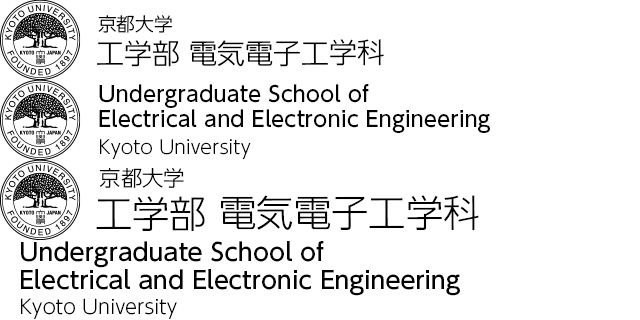Semiconductor Science and Engineering (Kimoto Lab)
When the Kyoto Protocol came into effect in February 2005, the "environmental century" truly began. We face the urgent challenge of reducing carbon dioxide emissions. To achieve this we need to substantially improve the energy utilization efficiency of electrically powered technologies such as trains, electric cars, air conditioners, and refrigerators. The key to accomplishing this is enhancing the performance of the semiconductor power devices that constitute the core components of electric power circuits known as inverters. At the same time, the rapid growth in the use of information and communications technologies such as mobile phones and the Internet is also fueling substantial growth in electric power consumption. The drive to improve information and communications technologies must focus not only on improving performance parameters such as power, speed, and memory capacity, but also on reducing power consumption.
Up until now, silicon (Si) has been the main material underpinning the development of semiconductor devices, and the history of semiconductor performance evolution has essentially been the story of the miniaturization of MOS transistors. Soon, however, this growth in performance due to "miniaturization" (or "scaling") will start to face a variety of physical limitations (e.g., the short-channel effect, thermal management, and quantum-level fluctuations). Accordingly, in order to sustain further improvements in both the performance and power consumption of semiconductor devices into the future, it is necessary to adopt new scientific principles and new materials, and to actively utilize leading-edge technologies like nanotechnology. These first years of the "environmental century" happen to represent a major turning point in the research and development of semiconductor materials and devices. The field of semiconductors offers a scientific discipline that is diverse and rich in these new technological developments. This lab is striving to improve both the performance and energy efficiency of semiconductor devices, by cultivating new semiconductor materials that are unproven in terms of production processes or electronic properties, and by enabling new device designs. We are pursuing research in a wide range of research aimed at creating semiconductor devices to serve as the foundations of IT (information technology) and PT (power technology) for the 21st century—from basic research on the elucidation and control of semiconductor electronic properties, and the growth of semiconductor crystals, to applied research on the design, fabrication, and evaluation of semiconductor power devices.
Main research themes
- Epitaxial growth of wide-bandgap semiconductor silicon carbide (SiC)
- Epitaxial growth of wide-bandgap semiconductor group-III nitride
- Control of electronic properties of wide-bandgap semiconductors
- Realization of ultra-low-loss semiconductor power devices by new device structure and novel device fabrication process
- Cultivation of functional electronic materials such as variable resistance materials and their utilization in semiconductor devices
- Microelectromechanical systems (MEMS) utilizing wide-bandgap semiconductor materials
Please visit the Lab home page for more details.
Academic Staff
Tsunenobu KIMOTO
![]() Professor (Graduate School of Engineering)
Professor (Graduate School of Engineering)
Research Interests
- Growth, characterization of wide-bandgap semiconductor SiC
- SiC Device fabrication process
- Control of SiC MOS interface properties
Classes
- Fundamentals of Electron Physics and Devices
- Semiconductor Engineering
- Electrical and Electronic Engineering Advanced Practice B
Contacts
Katsura Campus A1-303
TEL: +81-75-383-2300 (direct)
FAX: +81-75-383-2303 (lab.)
E-mail: kimoto kuee.kyoto-u.ac.jp
Jun SUDA
![]() Associate Professor (Graduate School of Engineering)
Associate Professor (Graduate School of Engineering)
Research Interests
- Growth and characterization of wide-bandgap group-III nitride
- Control of III-N/SiC heterostructure for device applications
- Device simulation of wide-bandgap power devices
Classes
- Fundamentals of Electron Physics and Devices
- Semiconductor Engineering
- Electrical and Electronic Engineering Advanced Practice B
Contacts
Katsura Campus A1-303
TEL: +81-75-383-2301 (direct)
FAX: +81-75-383-2303 (lab.)
E-mail: suda kuee.kyoto-u.ac.jp
Yusuke NISHI
![]() Assistant Professor (Graduate School of Engineering)
Assistant Professor (Graduate School of Engineering)
Research Interests
- Fundamental study on resistive switching materials
Class
- Electrical and Electronic Engineering Practice A
Contacts
Katsura Campus A1-303
TEL: +81-75-383-2302 (lab.)
FAX: +81-75-383-2303 (lab.)
E-mail: nishi kuee.kyoto-u.ac.jp
